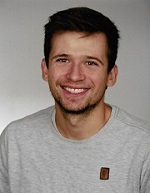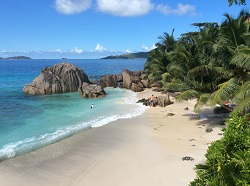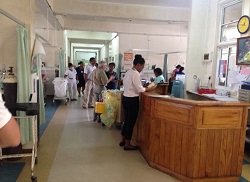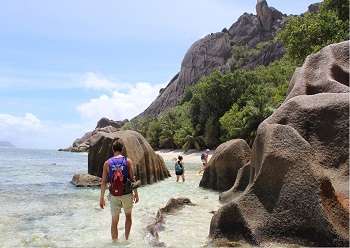by Florian Moik.

Florian Moik, School of Medicine University Graz, Austria
After my 4th year of studies at the Medical University of Graz, Austria, I completed a 4-week-elective at the Medical Department of the Seychelles Hospital in Victoria, Seychelles. My studies in Graz are very skill orientated with many opportunities to gain experience in clinical practice. Despite that, I always wanted to gain as much experience as possible in other countries and systems. My motivation to do an elective in this exotic country was based on the experience of a colleague of mine, who completed this elective one year before. He gave me an idea about the possibility of getting some insights and gaining some experience in this country. Having spent all my other electives in western countries, I was thrilled to see the differences in the health care system as well as in practice in the Seychelles compared to our standards.
The Seychelles are a country located in the Indian ocean, consisting of many far spread islands. The islands Mahé with the capital Victoria, which is the biggest island, as well as the smaller islands of La Digue and Praslin form the so called “Inner Islands”. Those islands were also the ones I visited. The languages used are mostly English and French, especially amongst the older generation, as the Seychelles were a British as well as a French colony. The other people speak a mixture of different languages (French, English and African languages) called Creole.
The main hospital on the Seychelles is in the capital, Victoria, with many small outpatient departments spread across not only the main island but also the smaller islands. These ambulances are being visited by the doctors on a strict schedule.
Organisation and Planning
To organise your elective on the Seychelles there are three major points to do. First, you have to get in contact with the local hospital in order to get a placement for your elective. Secondly, you need a place to stay and third you need to organise your flight.
 I applied one year in advance to Mrs. Natasha Marie, who works for the ministry of health and is responsible for the elective placements and organisational issues during the stay. After about 3 weeks, I received the confirmation of the placement as well as a list of possible apartments for me to stay.
I applied one year in advance to Mrs. Natasha Marie, who works for the ministry of health and is responsible for the elective placements and organisational issues during the stay. After about 3 weeks, I received the confirmation of the placement as well as a list of possible apartments for me to stay.
I decided to stay at “Villa la Cachette” in Bel Ombre, the contact person for this stay was Agnela Fanchette. You will get precise contact information with the list of apartments. I stayed in an apartment with two other students, 20 minutes by bus from the capitol “Victoria” where the hospital was. The apartment was in a nice area close to mountains and only 5 minutes’ walk away from beach. The flat was clean, very well equipped and had a very nice atmosphere as well – most of the house and furniture was made of wood in a typical Seychellois-style.
All the information about where and when to report was given by Natasha Maria herself. On the first day of the elective I had to pay a fee of 350 € to get a confirmation and then I had to head to the immigration office in Victoria where I got my residence-card. This card does not only make you a proper Seychelles-resident for the time, but also gives you great benefits on flight and ferry rates during your stay. The Immigration Office is within walking distance to the hospital, Natasha Marie will give you the direction.
At the Seychelles Hospital – Clinical Elective
Located at the northern end of the island of Mahé, the Seychelles Hospital is the national referral hospital providing specialist inpatient and outpatient facilities. I applied for the department of internal medicine because that is where my interests mostly lie. Because of the small number of patients, all internal subspecialties as well as neurology are treated at the same department, the department of medicine. The day at the medical department starts at 8 am with the morning meeting of the doctors. The patients that were admitted overnight are presented to the day-staff and ongoing medical problems are discussed. The atmosphere in these meetings is very light, like it is always on the Seychelles, with a lot of jokes and stories being told beside the medical talks.
After the morning meeting the doctors (about 5 MDs per shift) start their morning rounds in the open, 30 beds ward, which is one of the two floors of the department of medicine. The beds are separated by curtains, which usually tend to be open. This leads to a lack of privacy for the patients on the one hand but also to the benefit for me as a student of not missing anything that was going on.
Every doctor does his round by himself and is only accompanied by a nurse and maybe some students. They are normally very happy to have some company and are willed to answer questions about the patients.
Most of the everyday tasks like blood works and infusions is done by the nursing staff, so these tasks, that I had to do at previous internships in Austria, were not on my daily schedule. I spent the time after the rounds with physically examining the patients, talking to them and discussing them with the doctors. The patients suffered from a vast heterogeneity of diseases, given the broad spectrum being treated at the ward.
The Seychelles have a severe alcohol, drug and obesity problem which leads to many of the related diseases. For example, I saw a large amount of lifestyle associated diseases such as alcoholic induced liver cirrhosis, hepatorenal syndrome, apallic syndrome due to hypoxic encephalopathy after a heroin overdose and many more. Further on, I have seen many cases of (tropical) infectious diseases such as dengue fever, leptospirosis, malaria, filariasis or strongyloidiasis.
The combination of different fields of medicine, all being treated at the same place as well as the open atmosphere at the ward were very helpful for me. Firstly, the broad spectrum of patients gave me a great opportunity to see and learn a lot. Secondly, I was able to work very independently, for example switch to another doctor when the first one has finished the rounds, or to really take my time and examine and question the patients. Therefore, this elective gave me some great chances to learn a lot.

© Florian Moik – Medical Ward
On the other side, the medical standards are well below western standards and many of the doctors come from many different countries such as Sri Lanka, Cuba, Pakistan and Serbia. The reason for this is that the Seychelles do not have their own medical university. To cover up for the deficiency in medical professionals, they have two strategies. First, they try to attract doctors from around the world with a salary that is higher than in most of these doctors’ home countries. Secondly, they send their students to universities around the world, such as Slovakia or the Czech Republic and pay for their education. After that the students must come back “home” and work on the Seychelles for at least 5 years, otherwise they would have to refund the costs of their education in foreign countries. Due to that, many of these doctors are on the Seychelles for a limited amount of time and therefore the teamwork is not working well. This leads to many mistakes such as lost test material, a lack of communication with the patients and among the medical team and an overall feeling of lack of organisation and quality of care. The technical standard was higher than I expected: They had a fully equipped lab as well as an MRI and CT machine. The working day normally lasted until the early afternoon, even though I sometimes stayed a little longer because of interesting cases. There was the possibility of visiting other wards and the emergency department. As there are many students in all different specialties you can just accompany them, and you will get to see the whole spectrum of the Seychelles Hospital. All in all, I got very good insights in the working process and atmosphere at the hospital and had a very interesting time.
My off-times
The Seychelles have a lot more to offer than you would think, when you have only heard about them as a holiday destination for luxury seeking travellers. Beside the extraordinary beautiful beaches, which officially are among the most beautiful in the world, there is a lot more to see. For example the inner region of the main island is covered with mountains and tropical jungle with great trails for hiking. There are also some amazing national parks with a unique flora and fauna.

© Florian Moik – Hiking around the south coast of La Digue
My highlights were a trip to La Digue and Praslin, which are two smaller islands. Furthermore, I made a round trip by car around the main Island of Mahé , where I visited all the beaches along the coast, with many of them being completely untouched by tourism. I also tried to participate as much as possible in the cultural and social life of the Seychelles, taking place at night markets or barbecues at the beach. The mixture of cultures, based on its creole heritage, with a strong African vibe makes the Seychelles a great place to experience a unique culture.
Costs
- Flight: about 600 € when booked early
- Appartement: 20 € per night
- Hospital Fee: 350 €
- Food: comparable to central European prices, maybe a little bit cheaper.
- Bus: very cheap tickets, only a couple of cents per ride.
Conclusion
In summary, I highly recommend applying for a clinical elective on the Seychelles Hospital at the main island of the Seychelles. Not only to experience the medical practice in a non-industrialized country, but also to gain insights into a culture and a way of life that we normally do not get in touch with in the western world. The natural beauty of this country and its broad spectrum of possible activities makes this the perfect destination for making great experiences.
Interesting Websites
- Website of the Ministry of Health, Seychelles
- Website of the Immigration Office
- Application: medicalelectives@health.gov.sc
- Information on the Seychelles Hospital
- Things to know about the Seychelles
- Website of Seychelles-tourism
Here you can download the experience report as PDF file.
If you are interested in working abroad as a medical student or doctor, click here for more information.
Published in GI-Mail 11/2018 (English and German edition). Sign up for GI-Mail here. 
Tip: More up to date educational events can be found online in the Education Database »medicine & health«.
